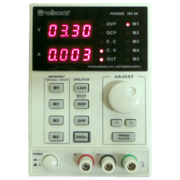Korad KAxxxxP series
 | |
| Status | supported |
|---|---|
| Source code | korad-kaxxxxp |
| Channels | 1 |
| Voltage/current (CH1) | various |
| Connectivity | USB/serial |
| Features | programmable presets |
| Website | koradtechnology.com |
The Korad KAxxxxP series are 1 channel switch-mode programmable power supplies with USB/serial connectivity.
The devices are also sold as rebranded versions by e.g. Velleman or Tenma/Farnell.
Devices
| Korad | Velleman OEM | Tenma OEM | Voltage range | Current range | Power |
|---|---|---|---|---|---|
| Korad KA3003P | — | Tenma 72-2535 | 0-30 V | 0-3 A | 90 W |
| Korad KA3005P | Velleman PS3005D, Velleman LABPS3005D | Tenma 72-2540 | 0-30 V | 0-5 A | 150 W |
| Korad KA3010P | — | — | 0-30 V | 0-10 A | 300 W |
| Korad KA6002P | — | Tenma 72-2545 | 0-60 V | 0-2 A | 120 W |
| Korad KA6003P | — | Tenma 72-2550 | 0-60 V | 0-3 A | 180 W |
| Korad KA6005P | — | — | 0-60 V | 0-5 A | 300 W |
Note: The libsigrok korad-kaxxxxp driver needs to know about the device's ID (the response to the *IDN? command, see below). If you have a device which is not yet listed in the driver, please let us know.
Protocol
The protocol is serial or serial-over-USB, 9600/8N1, (almost fully) ASCII based. No line termination, CRC or checksum characters are used. The PC sends a request string which the power supply then responds to.
During a PC connection, the front control buttons and the scrollwheel are blocked.
| Request | Example output | Remarks |
|---|---|---|
| *IDN? | KORADKA3005PV2.0 VELLEMANPS3005DV2.0 VELLEMANLABPS3005DV2.0 |
Request identification from device. |
| STATUS? | (byte) | Request the actual status. The output is a single byte with the actual status encoded in bits. At least the Velleman PS3005D V2.0 is a bit buggy here. The only reliable bits are: 0x40 (Output mode: 1:on, 0:off), 0x20 (OVP and/or OCP mode: 1:on, 0:off) and 0x01 (CV/CC mode: 1:CV, 0:CC). |
| VSET1? | 12.34 | Request the voltage as set by the user. |
| VSET1:12.34 | (none) | Set the maximum output voltage. |
| VOUT1? | 12.34 | Request the actual voltage output. |
| ISET1? | 0.125 | Request the current as set by the user. |
| ISET1:0.125 | (none) | Set the maximum output current. |
| IOUT1? | 0.125 | Request the actual output current. |
| OUT1 | (none) | Enable the power output. |
| OUT0 | (none) | Disable the power output. |
| OVP1 | (none) | Enable the "Over Voltage Protection", the PS will switch off the output when the voltage rises above the actual level. |
| OVP0 | (none) | Disable the "Over Voltage Protection". |
| OCP1 | (none) | Enable the "Over Current Protection", the PS will switch off the output when the current rises above the actual level. |
| OCP0 | (none) | Disable the "Over Current Protection". |
| TRACK0 | (none) | Set multichannel mode, 0 independent, 1 series, 2 parallel (from Velleman protocol v1.3 documentation). |
| RCL1 | (none) | Recalls voltage and current limits from memory, 1 to 5 (from Velleman protocol v2.0 documentation). |
| SAV1 | (none) | Saves voltage and current limits to memory, 1 to 5 (from Velleman protocol v2.0 documentation). |
Remarks:
- The digit 1 in the V... and I... requests indicates the values are meant for channel one. In future (or "higher"?) models this may be two for a second channel and so on.
- Voltage ("00.00" to "31.00" V) and current ("0.000" to "5.100" A) output values have a fixed length with fixed dot position. The values won't become negative.
- ISET1? replies sixth byte on many models (all?) which is sixth character from *IDN? reply if *IDN? is queried before during same power cycle. This byte is read and discarded by sigrok.